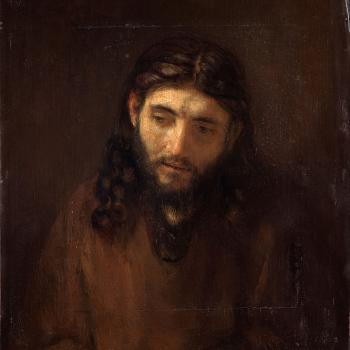***
***
***
Is God in time or is he timeless?
Obviously the latter.
Either stance a Christian takes leads to some kind of incoherence.
No; saying He is in time leads to insuperable logical and biblical difficulties. Being out of time does not.
Let me simply use Christian philosopher Paul Helm’s analysis of this in “God and Spacelessness,” Philosophy 55 (1980).
Helm begins with two authors who made similar claims against the timelessness of God. J. R. Lucas made this claim: “To say that God is outside time, as many theologians do, is to deny, in effect, that God is a person.” He reasons that to be a person is to have a mind, and to have a mind requires that it be in time (i.e., thoughts require a sequence of events, etc.).
For finite created beings, sure. But an infinite, self-existent, timeless, omniscient being overcomes this limitation, it seems to me. If a being knows everything at once, no sequence is required to “work through” the patterns of thinking and analysis that we are familiar with, as finite creatures.
A.N. Prior claimed that a proposition such as “It is raining now” is not equivalent in meaning to “It is raining on Tuesday,” and that an omniscient God who knew the latter would not necessarily know the former,
I don’t follow this reasoning. I’d have to see the basis for why this person thought that.
and would not know it if he were timeless, since he could not be present on the occasion on which it was raining.
Omnipresence would overcome that. Omniscience, too. I don’t see the point of projecting inherent human limitations onto God. Atheists often complain that God is a projection. Yet here the sub-orthodox thinkers do exactly the same thing. The Christian, on the other hand, accepts God as He has revealed Himself to be. The Christian God is not the sort of being Who could readily be made up by man, precisely because His nature is so much more complex than ours and difficult to comprehend.
[These are pretty persuasive arguments, I might add].
Really? I don’t see that they are, based on the summary. I would need to see more to understand how they argued their case in full.
But Helm argues against both authors by merely showing that such a claim also entails the denial that God is spaceless, which in turn denies that God is infinite – something these authors want to maintain. Helm writes that “the arguments used to show that God is in time, in effect support the view that God is finite, and so anyone who wishes to maintain that God is infinite, as the traditional theist does, will either have to find other arguments for the view that God is in time, or eschew the idea of God being in time altogether” – this is the dilemma Helm presents to these authors. And he claims, “if the timeless existence of God is incoherent then so is the spaceless existence of God.”
A spirit does not have spatial qualities.
[I happen to agree that they are both incoherent].
Big surprise!
Helm does not try to show that God is in fact timeless, nor is his purpose to show that the logic of these two authors is wrong. He admits that he doesn’t even fully understand what it means to say God is both timeless and spaceless. He’s only claiming that a denial of God’s timelessness is also a denial of God’s spacelessness.
After making his arguments he leaves the reader with three alternative consequences to choose from:
1) “Theism is even more incoherent than was previously thought, in that it requires unintelligibilities such as a timeless and spaceless existence.” [To this I completely agree with him here.]
2) Recognize that since the belief in God requires an infinite and spaceless God “there must be something wrong” with the arguments against the timelessness of God.” [However, it’s far from the case that the Bible describes anything but God’s activity in time, especially with the purported incarnation. Nicholas Wolterstroff’s essay, “God Everlasting” has more than sufficiently shown this, as has Clark Pinnock’s essays and books.] The Bible simply does not require that God is timeless. This view of God has been something fully adopted because of neo-Platonism and finally codified by Anselm’s conception of the “greatest conceivable being.”
3) These authors must “supply an argument against God’s timelessness that does not have a spatial parallel.” [To date this challenge has not been sufficiently met].
I would argue, as always, that the Bible is presented in pre-philosophical language. Therefore, one can say that the doctrines later developed to a very high degree by theologians, are usually not found fully-developed in the Bible. Again, this is because it is not presented in philosophical, or “Greek” terms, for the most part, excepting some portions of Paul, and things like Logos (“word”) in John, which was, I believe, Greek philosophical terminology.
On the other hand, it is obvious that God must be outside of time, if one accepts the description of Him that the Bible offers.
For example: how does God create everything that exists, while still being in time? How does He create the universe in such a fashion? There is no time, according to modern physics, without the matter which time entails in order to have any meaning. An eternal, omniscient spirit is not subject to time because there is no sequence to either His existence or “thoughts.”
One has to explain how there can be some mysterious thing called “time” before there was a material universe. What would it be? How could it be defined? What sense does it make to say that an eternal spirit-being is “in” it? What then changes when matter is introduced to the set of “real” things?
Both Newtonian and relativistic Einsteinian time depend on a material universe by which they are determined and measured: this involves the relationship of matter with other matter. Time is indeed another dimension (at least as I understand relativity, in layman’s terms).
Therefore, it is impossible, even by modern physics standards, and any reasonable form of philosophy, to say that God could be “in time” and create the universe while being in such a state. It’s a meaningless concept. Whatever the truth is, it can’t be that, because it is nonsensical and utterly illogical.
Secondly, the Bible gives ample indication of timelessness; e.g., the description of God, “I AM,” from the burning bush and Moses (Exodus 3:14-15). Jesus later repeated this (because He, too, is an eternal being), in saying, “Before Abraham was, I am” [ego eimi] (John 8:58). See also: Gen 21:33, Ps 90:2, Is 40:28, Hab 1:12, Rom 16:26, 1 Tim 1:17.
Greek scholar Gerhard Kittel (Theological Dictionary of the New Testament) explains the “I am” clauses:
The formulas [eimi: ‘to exist’ and ho on: ‘I am’] express God’s deity and supratemporality. Similar formulas occur in Judaism. The Greeks also use two- and three-tense formulas to express eternity (cf. Homer, Plato . . .). These possibly came into Revelation by way of the Jewish tradition, though a common source may lie behind the Greek and Jewish traditions.
ego eimi as a self-designation of Jesus in Jn. 8:58 (cf. 8:24; 13:19) stands in contrast to the genesthai applied to Abraham. Jesus thus claims eternity . . . The point is not Jesus’ self-identification as the Messiah (‘I am he’) but his supratemporal being.
(pp. 206-207 of one-volume edition)
The section on aion (“age, aeon”) elaborates:
The double formula ‘for ever and ever’ (Heb. 1:8), especially in the plural (in Paul and Revelation; cf. also Heb. 13:21; 1 Pet. 4:11), is designed to stress the concept of eternity, as are constructions like that in Eph. 3:21 (‘to all generations for ever and ever’).
a. aion means eternity in the full sense when linked with God (Rom. 16:26; 1 Tim. 1:17; cf. Jer. 10:10)
b. In the OT this means first that God always was (Gen. 21:23) and will be (Dt. 5:23), in contrast to us mortals. By the time of Is. 40:28 this comes to mean that God is eternal, the ‘First and Last,’ whose being is ‘from eternity to eternity’ (Ps. 90:2). Eternity is unending time, but in later Judaism it is sometimes set in antithesis to time. The NT took over the Jewish formulas but extended eternity to Christ (Heb. 1:10 ff.; Rev. 1:17-18; 2:8). Here again eternity could be seen as the opposite of cosmic time, God’s being and acts being put in terms of pre- and post- (1 Cor. 2:7; Col. 1:26; Eph. 3:9; Jn. 17:24; 1 Pet. 1:20).
(pp. 31-32)
The word was used in the Septuagint translation of the OT (LXX). Plato had used it in the sense of “timeless eternity in contrast to chronos as its moving image in earthly time (cf. Philo)” (p. 31).
So this is how the word was understood. The Greek translators thought it was best to apply this word to God, and the increased development of understanding of philosophical-type issues of this sort added clarification to the Jewish and later Christian doctrine of God.
That is, Helm argues that one can either, a) Deny (or accept) the unintelligible existence of both a timeless and spaceless God,
I suspect that he would frame the question as being ultimately mysterious and difficult to human minds, but not “unintelligible” – which implies an irrationality and unreasonableness to the Christian doctrine of God. Helm appears to be an orthodox Christian, from what I can tell (he and I would agree on the doctrine of God).
b) Accept the consequences of a God who is both in time and finite, or,
This is radically unbiblical; hence no Christian who accepts biblical inspiration could possibly take this view.
c) Supply other arguments on behalf of a God who is in time which does not also deny God’s spacelessness. Not being able to do (c) presents the dilemma of choosing either (a) or (b).
God cannot be in time, according to the Bible, or any rational belief that He created the universe. The first scenario is impossible exegetically, the second, logically, and scientifically (i.e., if one presupposes a creator and then subjects such a concept to theoretical scientific analysis).
Here is a Christian philosopher of some note who recognizes a very serious problem in reconciling God and time. He makes my case for me.
I suspect you are slanting his full argument. If he is orthodox, he would not put it in such despairing terms. He would say it was ultimately a mystery (meaning we can’t fully understand or comprehend it; not that it is literally irrational).
On the one hand we have the Bible, which clearly shows God responds to us in time,
Yes, of course. It must do so, in the sense of anthropomorphism, precisely because we can barely comprehend a timeless being. But God does break into time. We see that with the incarnation. Jesus lived in history. When God took on matter and a human body, the incarnate God subjected Himself to time, because that is the nature of matter and human bodies. It’s not a contradiction because God created time and matter; therefore He can partake of it if He so chooses, in terms of becoming incarnate.
along with the philosophical arguments of J.R. Lucas and A.N. Prior. On the other hand, a being in time also denies that God is spaceless. Which is it?
I have given the orthodox Christian, biblical view of God. It is not incoherent or illogical at all.














